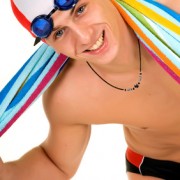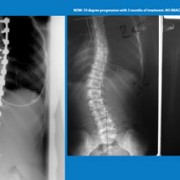This is How Scoliosis Affects Confidence
 Has scoliosis caused a decline in confidence for a family member or a friend? Has his or her self-esteem gone down? Have they stopped pursuing their goals? Are they spending less time going out and doing activities they love because they are worried their curve will show? Coping with a scoliosis diagnosis can be a burden, and it can have just as many emotional effects on a person as physical effects.
Has scoliosis caused a decline in confidence for a family member or a friend? Has his or her self-esteem gone down? Have they stopped pursuing their goals? Are they spending less time going out and doing activities they love because they are worried their curve will show? Coping with a scoliosis diagnosis can be a burden, and it can have just as many emotional effects on a person as physical effects.
Scoliosis is diagnosed when an individual’s spine has a side to side curvature. On an x-ray, the spine takes on an “S” or “C” shape. Scoliosis can affect the shape of an individual’s back, shoulders, rib cage and hips. These changes may lead to self-esteem issues and further challenges for the individual. Many times people with scoliosis are unwilling to pursue activities that may expose the curvature of their spine. Physical activities are further limited if a brace is used as treatment. A scoliosis diagnosis can place a large amount of stress and anxiety on an individual and may cause them to withdraw from social interactions and stop pursuing their goals and interests.
In order to show support for a person with scoliosis, communicate to them that you understand their feelings. Talk to them about the condition and the available treatments. They may have fear that they will not be able to achieve their goals with scoliosis, but don’t allow them to push aside their aspirations. Encourage them to keep working toward their goals by providing them with examples of people that have gone on to accomplish remarkable feats.
Here are some outstanding examples:
Olympic Swimmer Natalie Coughlin
Coughlin wasn’t diagnosed with scoliosis until she was 30 years old when her curvature was 27° – the x-ray and the shape of her spine shocked her. Coughlin didn’t let her diagnosis stop her. At the 2008 Beijing Games, she became the first female U.S. Olympian to win six medals during one Olympic Games. Coughlin also tied with two other Olympians for the most all-time medals by a female swimmer. She continues to pursue her dreams by preparing for the 2016 Olympic Games in Rio.
Olympic Sprinter Usain Bolt
Bolt was born with scoliosis, and he did not let it stop him from becoming known as the world’s fastest man. He won three gold medals at the 2008 Beijing Games in the Men’s 100m, the Men’s 200m, and the Men’s 4x100m Relay. He defended each of these titles at the 2012 London Games. Bolt has also won several medals at World Championships between Olympic Games.
Olympic Swimmer Jennifer Thompson
Just like fellow swimmer Natalie Coughlin, Thompson did not allow scoliosis to affect the pursuit of her dreams. Thompson is a twelve time Olympic medalist, including eight gold medals from the 1992, 1996, 2000, and 2004 Summer Olympics. She is one of the most decorated Olympians in history because she chose to fight for her dreams despite challenges brought on by her scoliosis.
Scoliosis may be an extra obstacle on the journey but it is not a dead-end. Each of these athletes is proof that anything is possible. Next time your family member or friend is feeling down about their scoliosis remind him or her of this: With the right treatment and the right attitude, anyone can triumph over scoliosis. If you, yourself, are dealing with the emotional effects of scoliosis think of these athletes as well, and know that if you put your mind to it you can accomplish anything.
For more information, contact us at South Florida Scoliosis Center 305-705-0777, or visit www.southfloridascoliosiscenter.com.
South Florida Scoliosis Center is the only CLEAR Scoliosis Treatment Center in the South Florida area in addition to being one in only 18 worldwide clinics to offer Intensive Care Scoliosis Treatment.
South Florida Scoliosis Center draws patients from the entire state as well as from countries abroad.










